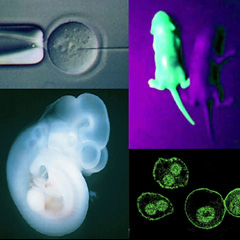Department of Animal Resource Sciences

The primary aim of our research and education is to maximize the utility of various functions of animals, mainly mammals, by revealing mechanisms underlying diverse and complex life phenomena. To this end, me are attempting to elucidate life phenomena from a variety of perspectives, ranging from molecular biology to ethology.
We also aim to improve productive capability of animals and to seek effective ways for preserving valuable genetic resources, by applying stateof- the-art biotechnologies that enable drawing out the potentiality of animals or animal cells. At the same time, high priority has always been placed on fostering rich human nature of our students.
The graduates from our department are now occupying important positions not only in the field of animal resource sciences but also in other fields such as medical and pharmacological sciences. We welcome you who are full of ambition!
Laboratories
Department of Animal Resource Sciences
| Bio-regulatory Systems | |
|---|---|
| Molecular Immunology | Molecular biological studies in immune system Development of disease resistance using transgenic technology Molecular mechanisms in immunity against protozoan infection |
| Applied Genetics | Development and application of new animal biotechnologies on the basis of recent advance in molecular biology, cell biology, genetics, and reproductive biology in mammals Creation and improvement of useful traits in industrially important animals by artificial manipulation of genes and embryos |
| Animal Cell Regulation | Signal transduction in cell proliferation, differentiation, and carcinogenesis Molecular mechanisms in regulation of hormones’ action |
| Functional Bioscience | |
| Cellular Biochemistry | Studies on the molecular mechanisms underlying growth and differentiation of trophoblast lineage Elucidation of the role of genomic DNA methylation in the epigenetic control of cellular differentiation and mammalian development Investigation of molecular mechanism for the maintenance of totipotency and pluripotency Risk assessment of endocrine chemical disrupters for mammalian development |
| Veterinary Ethology | Chemical communication via pheromones in mammalian specie Nature or nurture questions for the personality formation Clinical studies in veterinary behavior medicine |
| Animal Radiology | Studies on lipid-signaling in inflammation: tumor, allergy, tissue regeneration. Studies on pathophysiological effects of low-radiation. |
| Bio-animal Science * | |
| Animal Life Science and Biotechnology | Studies on the molecular mechanism of oocytes selection in mammalian ovaries Artificial rescue of potential oocytes in the ovaries Safety and risk assessment of feeds and animal-derived foods Studies on nutritional effects of amino acids in farm animals |
* Cooperative course. The laboratory and its staffs belong to Animal Resource Science Center

